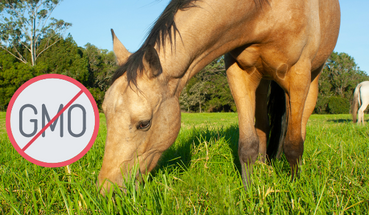Posted by Joyce Harman DVM, MRCVS on May 5th 2022
GMO and Glyphosates
What You Need to Know for Your Horse’s Health
Genetically Modified Organisms (GMO) and the herbicide Roundup® continue to affect the health of our horses every day. Science has documented gastric ulcers in pigs, liver and kidney damage in rats and cancer in humans.
What is a GMO product? Glyphosate is the active ingredient used in Roundup®, considered the most widely used herbicide in the world. GMOs occur when a new trait (e.g., resistance to Roundup®/glyphosate) is added to an organism (e.g., corn, soybean) by making changes directly to its DNA by inserting DNA pieces from another organism that may not even be the same species. So, it's mixing genes between species that could never naturally breed in the wild or even with domesticated breeding programs. In the case of horse feeds, the plants are resistant to the herbicide Roundup® or glyphosate, so farmers can spray the fields for weeds but not damage the crop. Unfortunately, this leads to super weeds. Frequently, farmers spray more herbicide to combat the super weeds more than they normally would have sprayed, thereby increasing the exposure to the chemical.
There are 10 crops that are GMO at this time, several of which are fed to horses on a regular basis. These crops include: alfalfa, apples, canola, corn (field and sweet, not popcorn), cotton, papaya, potatoes, soybeans, yellow squash, and sugar beets. In 2008, sugar beets became GMO and are currently found in most horse feeds. Corn and soybean have been GMO for much longer. Alfalfa is legal to grow as GMO, but since it's a perennial and not replanted every year, it has been slower to be adopted. There is great controversy over GMO alfalfa because it's pollinated by bees, making it easier to cross-pollinate with organic fields. It may also contribute to the decline of the bee populations.
Currently glyphosate is also sprayed right before harvest on wheat, buckwheat, barley, oats, lentils and beans that are not genetically engineered. Glyphosate kills the crop, and this dries it out so it can be harvested sooner than if the plant were allowed to die naturally. Residues have been found on most products made from oats, barley, wheat, chickpeas, lentils and many more foods. Grains fed to horses and livestock are not routinely tested in these studies but can be expected to be at least as high. Unfortunately, this means that just feeding non-GMO feeds such as oats and barley is not a way to escape the contamination.
Research has shown that pigs have severe stomach inflammation after just five months of eating GMO corn and soybean. Pigs have a similar digestive tract to horses (except for the fiber digesting cecum and large intestine). Horses are fed GMO corn, soybean and beet pulp for years. The increase in gastric ulcers and digestive tract issues has become much worse over the last 10 years. I have been in practice for more than 30 years and I’ve seen the changes that are occurring. Although it's true that diagnostic techniques have improved, it's clear to me that digestive problems have increased.
In the United States there are many lawsuits concerning the use of Roundup® and/or glyphosate causing cancer in humans. The juries are weighing the evidence and agreeing that cancers are related to the compound. Monsanto, the maker of Roundup® is, of course, fighting these cases, but the reality is that the evidence is convincing that Roundup® is not a safe compound.
In July 2017, California became the first state in the nation to list glyphosate in the state’s Proposition 65 list of chemicals known to cause cancer. Many countries around the world have significant restrictions in place controlling its use, and some locations have banned the use of glyphosate. Austria has completely banned it. This would not occur unless there was compelling scientific research to back up the claims that it causes illness.
So, what can you do to avoid glyphosate and Roundup®?
- Do not use the chemical on the farm to control weeds. If you need to spray, there are natural weed killers such as concentrated vinegar and others.
- Simplify your feeding program to use as many whole foods as possible.
- Coconut based feed such as CoolStance® are not sprayed.
- Hemp seed and protein sources are clean, especially if grown organically (https://shop.harmanyequine.com/?s=praise ).
- Use hay pellets as a base for adding supplements, making a healthier forage-based diet.
- Avoid ration balancers with high soybean content and use hemp and other plant proteins instead.
- Look at the foods you feed your dogs and cats, they have the same health issues and are more susceptible to cancers than horses.
- If you cannot change the feed, add ABC’s GRP supplement https://shop.harmanyequine.com/?s=grp ) that is designed to help animals combat the effects of glyphosate.
- An exciting new test is available to see if your animals or environment is contaminated. Visit https://hrilabs.org/glyphosate-testing/.
©This article is copywritten and cannot be reprinted without the author's permission.
Resources
Non-GMO sprays. https://www.planetnatural.com
Glyphosate testing https://hrilabs.org/glyphosate-testing/

